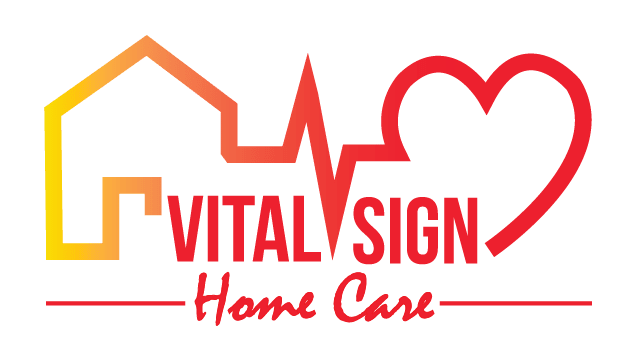Vital Sign Senior Home Care in Maryland. Respite Care at Home.
What Is Respite Care?
A respite is a short period of rest, and respite care refers to a short break in caregiving. Whether it’s for a few hours a week or an extended vacation, respite care gives the primary caregiver time to rest and recharge their batteries. Without respite care, many caregivers can go weeks or longer with no social interaction. Their mental health suffers the effects of isolation.
The adverse effects of caregiving worsen when the person is caring for a family member with dementia. In fact, the Caregiver Alliance (1) reports that home caregivers of dementia patients are twice as likely to become depressed as those caring for family members with other types of health problems.
The physical health of caregivers can suffer too. In some cases, the demands of looking after someone else are so rigorous. The caregiver goes without adequate rest or nutrition. They may even miss their own healthcare appointments.
Meeting friends for lunch, going to the gym, or running personal errands may not seem like much of a “vacation,” but having the time to do these simple things can make a world of difference to the caregiver.
Types of Respite Services
Taking a loved one to a residential program, a group home, or another specialized facility for a few hours or a few days is called out-of-home respite care. While it might be an option for some people, these facilities can be difficult to find depending on where you live. And in some cases, moving an ill person out of their familiar environment creates more problems than it solves. However, if the circumstances for out-of-home care are right, it can be a vital part of a caregiver’s overall support network.
In-home respite care involves a friend, a volunteer, another family member, or a paid professional coming in to look after the patient. At the same time, the caregiver leaves to do other things. In-home respite care is popular for its ease, allowing the patient to remain comfortable at home.
In-home care providers may be easier to locate than you think. Some places to find a trustworthy respite care provider include:
- Personal care providers to help with daily living skills
- Homemaker services to provide help with shopping, housekeeping, and meal preparations
- Skilled healthcare providers for high-level medical needs
- Trained professional caregivers hired from home-care businesses
- Friends and family members
Once a primary caregiver decides that respite care is an essential part of caregiving, they will see that many people and organizations are willing to help.
Vital Sign Home Care provides exceptional Respite Home Care for seniors in Anne Arundel County, Baltimore City, Baltimore County, Carroll County, Harford County, Howard County Maryland.

Who Pays for Respite Care?
After overcoming the guilt, some caregivers accept “needing help.” At that point, paying for respite care is the next big obstacle. Most private insurance plans do not cover the costs of in-home respite care. Veteran’s benefits and long-term care insurance may provide some coverage, but for the most part, in-home respite care is an out-of-pocket expense.
The costs involved depend on where you live, what types of services you need, and how long you need them. If volunteers or family members aren’t available to help, a primary caregiver may have to decide between which type of assistance is needed most and which type their loved one can afford.
With 10,000 people turning 65 every day in America (2), long-term care costs are a major concern. Nationally, the median monthly cost of a part-time home health aide is $2,080, according to Genworth Insurance. For many seeking respite care, help with basic housekeeping might be the most affordable option, even if it is not the most ideal.
Finding In-Home Respite Care Providers
- Screen applicants over the phone and follow-up with an in-depth, in-person interview
- Be specific about the tasks and schedules involved with your loved one’s care
- Be clear about compensation and scheduling payment
- Conduct a background check on the final handful of contenders
You have questions and we have answers, contact us today and one of our Vital Sign Home Care staff members will contact you shortly.
Benefits of In-Home Respite Care
Meeting New People
Elders stuck at home due to illness or disability rarely get to interact with anyone besides their caregiver. Meeting new caregivers can lead to new friendships and stimulating social interaction.Finding New Solutions
Sometimes it takes a fresh set of eyes to find the solution to an old problem. The experience and training of a respite provider could lead to improved care methods for your loved one.Widen the Support Network
Finding one new person to count on can open doors for your loved one. Remember, the family member you take care of is even more isolated than you are. They may worry about what will happen to them if something happens to them. Learning to trust a new caregiver can build confidence and help your loved one feel more supported. If you need a respite caregiver, we are here to help. We understand that finding quality care for your loved one is the priority. Contact us today to learn more about our in-home respite care services.We love hearing what others say about our medical and non-medical home care services. View our testimonials and find out why your family should use our services.
How We Provide In-Home Respite Care
A Person-Centered Care Process
Each agency is unique in its own way. At Vital Sign Home Care, we understand how important it is to plan for care that is person-centered, or in other words, focused on the client’s needs first. As soon as we receive an inquiry about our services, we begin our assessment process. This process involves reviewing personal and medical information that is unique to your loved one’s needs.
This process begins with a:
1. Phone Interview
Our admission coordinator will schedule a time to conduct an initial phone interview to gather as much information about your loved one’s needs as well as the family’s needs. Once this information is gathered, we will then schedule an appointment to meet with one of our RN coordinators to begin the next step.
2. Care Plan Meeting
Our care plan meetings are designed to assess your loved one’s home environment and recommend and plan care based on the information provided. After the care plan meeting, a person-centered plan is developed with the family’s permission. No plan is implemented until the family approves the plan.
3. Caregiver Selection
Our RN coordinator along with our admissions coordinators work together to select caregivers based on the needs and interests of the client and family. This process can be tedious but through. We take into consideration various factors to select the proper caregiver for your loved one. Experience as well as personality is taken into consideration during the selection process with a home visit arranged before the final decision is made.
4. Care Monitoring
Caregivers are required to document (care notes) daily about the day-to-day activities as well as the care provided. Care notes remain on-site at the homes. Our RN monitors the caregivers by doing unscheduled visits.
Our person-centered care process allows our RN coordinators to work closely with our admissions coordinators to select caregivers based on the needs and interests of the client and family. Get Started today!
References
- Depression and Caregiving – Family Caregiver Alliance
- Cost of Long Term Care by State | Cost of Care Report | Genworth
